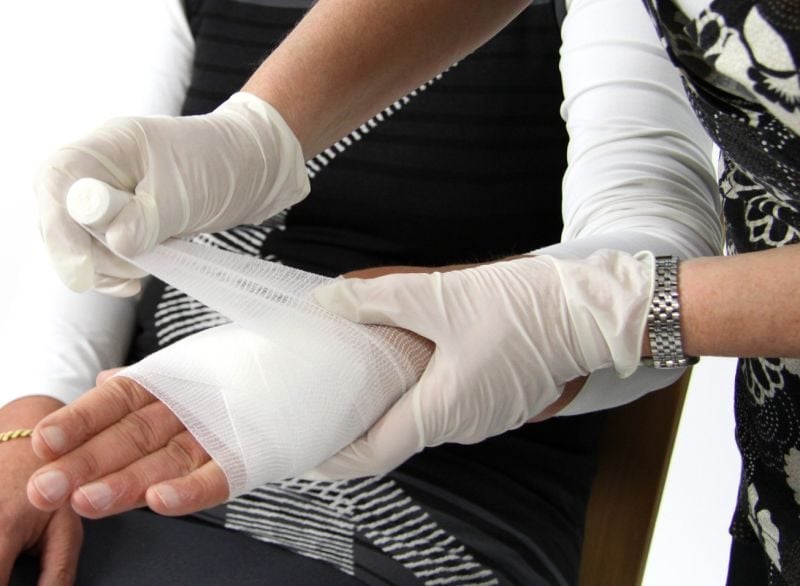Figure Out How Severe the Bite Is
Once your dog is no longer a concern, you and the victim have to evaluate the severity of the bite. A helpful tool for this is Dr. Ian Dunbar’s Dog Bite Scale:
In most cases, a Level 6 bite is administered to a prey animal — rabbits, birds, and even domestic cats. Luckily, a Level 6 bite administered to a human is pretty rare; in 2018, only 36 dog bite-related deaths were reported.
According to Dunbar’s Bite Scale, Level 1 and 2 bites are the most common and the most easily solved. Professional training will probably be enough to prevent future bites. If your dog nips someone and you’re able to smooth things over with them, look for trainers who can help with dogs who nip when fearful or excited.
Level 3 bites have a decent outlook as long as the victim is willing to work with you and you’re willing to start a rigorous training program. The victim might need medical attention, and despite the moderacy of the bite a lawsuit is quite possible.
Levels 4 bites are extremely serious. A dog who administers a Level 4 bite has little to no “bite inhibition,” which is the ability to stop himself from biting. Training this behavior away is not only difficult and time consuming, it can be dangerous. The victim will require medical attention and there’s a higher likelihood that you could be sued.
Level 5 and 6 bites are typically inflicted by dangerous dogs with little to no chance of rehabilitation. Unfortunately, dogs who inflict bites of this level of severity may need to be euthanized, and the owner may face criminal charges.
Now that you know how severe the bite is, you should help administer the proper first aid if possible.
Always make sure the victim thoroughly washes out the wound — use mild soap (nothing with fragrances) and plenty of water. Pat the wound dry with paper towels or a clean cloth use pressure stop further bleeding.

If the bite is a Level 3 or above, the victim should seek medical attention — this goes especially for people who are high risk for infection, such as elderly people or young children.
Though untreated dog bites only get infected about 16 percent of the time, the treating physician may recommend a course of prophylactic antibiotics — antibiotics that you take to prevent an infection from growing.
In some cases, stitches or staples may also be needed to treat the bite.
Not unlike when you get into a car accident, you want to make sure you exchange info with the victim. Get the victim’s name and number, and an email address if possible so that you can send them your dog’s vaccination records.
Try to get contact information from any witnesses as well. If the matter ever gets taken to court their testimony may be helpful.
Situations that involve uncooperative victims (or family members of victims) or severe bites will likely lead to legal action.
Preparing yourself is the best way to be protect yourself and your pupper. Contact an attorney immediately. This way, even if nothing comes of the situation, the attorney will have all the information he or she needs to help you.
When your dog bites someone on your property (which may include your car), it’s important that you reach out to your home or renter’s insurance to alert them of the incident.
Most insurance policies have coverage for medical expenses for injuries that took place on your property.

What Happens When a Dog Bites a Human?
The consequences of a dog bite depend on the severity of the bite, the relationship you have with the person who was bitten, and even your dog’s breed.
If the bite is minor and the person who got bitten was a family member or close friend, you may get by with a sincere apology and some first aid.
On the other hand, if the bite is severe and requires medical attention or your dog is a large or perceived “aggressive” breed, there may be legal ramifications.
The same applies to dogs with a history of bites. In rare cases, owners may even face criminal charges.
Follow the steps outlined below to assess the situation and be proactive in protecting yourself and your dog.

What You Should Do If Your Dog Bites Someone
First and foremost, maintain your composure. Apologize to the victim and let them know you’re going to help them.
Dog BITES Its Owner! How I Fix It Quickly!
As much as we love our pets and consider them to be members of the family, sometimes we don’t do the best job making sure to avoid putting our dogs in situations where they feel threatened or provoked. Dogs that feel threatened or provoked may bite. As we learned in a previous post, over 4.5 million people are bitten by dogs in the U.S. every year—and the vast majority of those bites happen to children and the elderly. Read more about dog bites and your rights here.
Here are some practical tips for dog owners to protect themselves, their dogs and the members of their community:
 1. Avoid circumstances that may encourage your dog to bite.
1. Avoid circumstances that may encourage your dog to bite.
You know what they say: the best treatment is prevention. It’s true in this case too—avoiding situations or triggers that may instigate your dog to bite. It’s important to remember that all dogs can bite because it’s an evolved form of defensive communication. Dogs will generally be more likely to bite if they are under stress of any kind—usually as a result of emotions like pain, fear, anxiety, or arousal. Different dogs have different triggers for these emotions and different responses to them: one dog may be afraid of children, and hide behind its owner upon seeing one; another dog may be afraid of bicycles and lash out upon seeing one by biting the cyclist to defend itself out of fear.
Know your dog’s emotional triggers, responses and warning signs so that you can have a sense of how it will behave in different situations. Growling, snarling or snapping, for instance, are ways that your dog is telling you that its nearing its bite threshold. When confronted with such a sign, find a way to put some distance between the dog and the stressor. However DON’T excessively punish the dog for behavior that isn’t biting. Growling is actually a good response for your dog to have to a stressor, because it lets you know that it’s upset. Moreover, if your dog’s angry barking causes you to become angry and threaten the dog, next time it becomes angry it will likely be even more stressed and won’t let you know—until it reaches its breaking point and crosses the line by biting someone.
If you dog is growling, snarling or snapping, consider contacting a reputable, licensed dog trainer or behaviorist to help you work through the behaviors before they escalate.
Though this may seem self-evident, many pet owners will react to a dog bite by becoming defensive and argumentative against the victim’s accusations, or by becoming angry and punishing the dog. Anxiety or aggression will only stress out or anger the victim even more than they were already (as well as the dog, who may then be incensed to bite again). Conversely, it you are polite and helpful, the victim may be less inclined to pursue legal action against you.
The worst thing you can ever do after an accident like this is to avoid responsibility. Instead, make it clear that you’re a good Samaritan and help the person bitten by your dog. Not only is this ethical, but it’s also a sound legal strategy. Should the bite lead to a personal injury trial and/or insurance settlement, you will be dead in the water if the judge or jury learns that you tried to flee the scene or conceal your identity. This may lead to either you or your insurance company having to pay far more in damages.
For these same reasons, you should obviously never lie to protect yourself or your dog in any way. That said, try to be brief in any and all discussions involving the incident to avoid incriminating yourself. You’ll obviously need to detail the incident to police, insurers, or medical care providers, but don’t blab about it to anyone else until you’ve had a chance to fully discuss the incident with your attorney.Advise that the victim receive medical care as soon as possible and assist if necessary.
4. Advise that the victim receive medical care as soon as possible and assist if necessary.
Your best hope is that the person your dog bit fully recovers as soon as possible, and medical attention is the best way to ensure that that happens. If the victim does not seek medical help, it could worsen over time. Should this be the case due to a lack of health insurance, hostility regarding the incident or another reason, contact your lawyer as soon as possible to discuss options. It might be in your best interest to offer to pay directly for the medical expenses of the person or pet that was bitten (You will often need to do this right away.
Though it may seem incriminating to call the police, attaining a police report is a good way to have the incident thoroughly documented by an unbiased third party and squash any potential false claims the victim may later make in court.
Find out as soon as possible whether dog bite claims are covered under your home or renter’s insurance policy. They typically are. You don’t necessarily have to make a claim (you may decide it’s in your best interest not to if the injuries are minor enough so that you can avoid the insurance paperwork and premium-increases) but if you don’t notify your provider in a timely enough fashion of the incident, you may be unable to make a claim or receive reimbursement at a later time. If you make a claim, you will be assigned an insurance adjuster to protect your rights. If the case is filed, you will receive an attorney to protect your rights—at your insurance company’s expense. If you do not have homeowners or rental insurance coverage that covers dog bites, get it. A rental insurance policy with $500,000 or more in liability coverage should cost you $15 or less a month.
Most importantly, make sure to have all of the animal’s vaccination records. This will help cap your liability by ensuring that the victim doesn’t have to seek additional treatment for rabies or other canine diseases.
In addition to medical care costs and reimbursement for lost wages, dog owners can also be held liable for noneconomic damages and such claims as: bite-related expenses for spouses, pain and suffering of pets after a dog bite, and emotional distress due to the death or injury of a pet. Make sure to ask your attorney which, if any, of these situations may apply to your case.